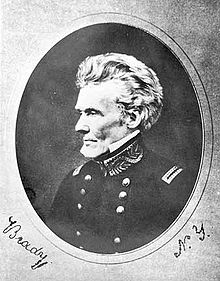Edmund Pendleton Gaines
| Edmund Pendleton Gaines | |
|---|---|
 |
|
| Born |
March 20, 1777 Culpeper County, Virginia |
| Died | June 6, 1849 (aged 72) New Orleans, Louisiana |
| Buried | Church Street Graveyard, Mobile, Alabama |
| Allegiance |
|
| Service/branch |
|
| Years of service | 1799-1800 1801-1849 |
| Rank |
|
| Commands held |
Fort Stoddert 25th Infantry Regiment Fort Erie Army of the Niagara Military District Number 6 Western Military Department Southwest Military District Western Division |
| Battles/wars |
War of 1812 Seminole Wars Black Hawk War Mexican-American War |
| Awards | Act of Congress Gold Medal |
| Spouse(s) | Frances Toulmin Barbara Blount Myra Clark |
| Relations |
George Strother Gaines (brother) Edmund Pendleton (great-uncle) |
Edmund Pendleton Gaines (March 20, 1777 – June 6, 1849) was a United States army officer who served with distinction during the War of 1812, the Seminole Wars, and the Black Hawk War.
Edmund Pendleton Gaines was born in Culpeper County, Virginia on March 20, 1777 as the seventh of fourteen children to James and Elizabeth (Strother) Gaines. He was named after his great-uncle Edmund Pendleton, who was a political leader of Virginia during the Revolution. James Gaines had been a captain during the Revolutionary War and afterwards moved his family to North Carolina, where he was a delegate to the state convention that ratified the United States Constitution and became a member of the North Carolina House of Representatives. The James Gaines family later moved to Kingsport, Tennessee; Edmund Gaines joined the army in 1799, and as commissioned as an ensign. He was discharged in 1800, but returned to service as a second lieutenant in 1801. He was promoted to first lieutenant in 1802, and captain in 1807.
In the early 19th century, Gaines surveyed routes and boundaries in the Mississippi Territory including parts of the Natchez Trace. In 1800, Lt. Gaines commanded ten companies of the 2nd Infantry Regiment in the construction of the federal post road from Nashville to Natchez. His experience led him to become a strong advocate of using the military to construct a national railroad system.
...
Wikipedia
